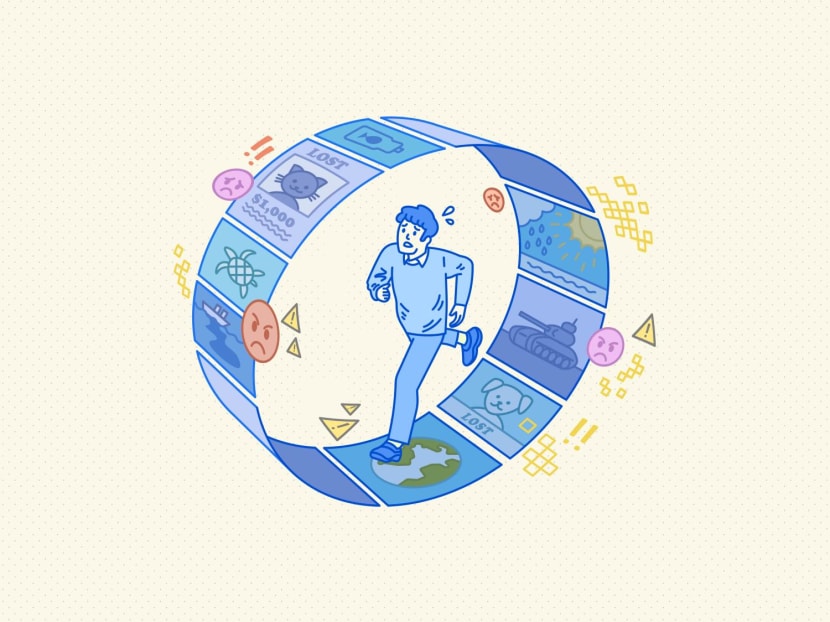Gen Zen: Do I care too much? I'm learning to stay engaged about causes close to my heart without feeling overwhelmed

Staying engaged with causes that are close to one's heart can be overwhelming and draining. (Illustration: CNA/Nurjannah Suhaimi)
SINGAPORE — I used to engage regularly with online content from cat welfare Facebook groups, reposting appeals for funds or lost pets.
Where I could not help personally, I had hoped that the posts I shared with others would eventually reach someone who could.
Over time, I became so overwhelmed by the sheer number of heart-wrenching posts that I started avoided content from these groups completely.
Then, at the end of last year, when a cat suddenly appeared near my place (likely abandoned, possibly lost), I started becoming active in these groups again with the hope of reuniting the feline with its family.
The owner never surfaced — and I ended up keeping the cat — but what surfaced instead was that familiar sense of despair as I scrolled through dozens of rehoming requests, as well as appeals for information for abuse cases and lost cats.
That sense of despair came this time with a side of guilt of having previously avoided such posts and consciously ignoring everyone (and every cat) who needed help.
Among the thoughts that raced through my mind were: “How many ‘Lost Pet’ posts have I missed? Were there donations drives I could have contributed to and made a difference?”
Speaking to friends made me realise that I was not alone with these feelings.
My friends were concerned about a range of issues from perennial ones such as climate change to wars that were happening far from our shores.
How does one protect their mental and emotional well-being from being overwhelmed, while still staying engaged with matters that are close to our hearts?
'TOO EASY' TO GET TRAPPED IN CYCLE OF NEGATIVE NEWS
As human beings with a sense of empathy and compassion, it is normal to feel upset when exposed to negative news, particularly relating to causes that we care about personally.
Health experts said that these feelings, which come by way of "secondary traumatic stress", also apply to events that are happening far away as long as they are in someway relatable to an individual.
However, it is "too easy" these days to get trapped in a cycle of negative news that leads us to feel an overwhelming sense of helplessness if we cannot solve an issue, they added.
Dr Geraldine Tan, director and psychologist at The Therapy Room, said that the algorithms of social media channels compound the problem by feeding users similar content that they are already engaging with or reading, but people also have a tendency to continue “looking for information to validate what we are already thinking about”.
“For example, if you see a post of one poor cat, your mind will start to wonder how many other cats are out there in a similar situation? Then you’ll start scrolling for more of such posts."
Apart from feeling overwhelmed by such issues and feeling helpless at not being able to deal with them, there is also the tendency for one to feel guilty when one decides to take a break from such content.
Dr Praveen Nair, senior consultant at Raven Counselling and Consultancy, said that it is "normal" to want to disengage because it is the brain’s way of dealing with secondary traumatic stress. This refers to the emotional distress that arises from vicariously experiencing the traumatic experiences of another person.
“Think of it in basic pain terminology. If you experience pain in your shoulder, that can be your brain’s signal for you to stop using the shoulder until potential soft tissue damage has healed,” Dr Nair added.
"Such disengagement from normal activities allows the body to heal speedily and return to a state of optimal functioning.
"The mind is no different in this regard."
The desire to disengage from reading negative news is like the brain's signal for you to step away from the vicariously traumatising or highly upsetting media content that you are consuming until your mind and emotion recover.
Senior therapist Tom Maniatis from Promises Healthcare said that it is also common to feel a sense of guilt when disengaging because you would feel as if you have “abandoned” a cause that is close to your heart.
“However, taking care of yourself doesn’t mean you don’t care,” he added.
CHOOSE MEDIUMS THAT ARE LESS OVERWHELMING
A simple step to combat "doomsday" scrolling is to set certain times of the day to check the news or social media and to limit your scrolling time.
This way, one can stay informed without feeling overwhelmed, Mr Maniatis proposed.
Dr Tan from The Therapy Room acknowledged that certain jobs may require a person to be exposed to or even consciously read negative news, and cited a reporter's job as an example.
She advised me to view each upsetting story that I have to work on — an explainer piece about a certain tragedy, for example — as an isolated project with a definite start and end.
"After you are done with the so-called project, stop reading up or researching on the issue for a while," she suggested.
“Then you won’t feel that the negativity is endless; you sort of know there’s a light at the end of the tunnel.”
During the periods between reading about and engaging with the issues that weigh heavily on our hearts, we may want to find time and ways to administer self-care, the mental health experts said.
One way is to set aside time to take up activities that help you relax, like taking a leisurely walk.
Mr Maniatis and the other experts also pointed out that the form in which online content is being consumed does make a difference to how intensely one can be affected.
“For example, videos or news broadcasts with dramatic music can feel more distressing than reading articles. Choose the medium that feels less overwhelming to you,” Mr Maniatis said.
TAKE ACTION, HOWEVER SMALL
The experts' other advice is to focus on causes where one can create a meaningful impact and take action or steps — for example, where one may volunteer or raise money to assist beneficiaries.
This may regulate the feelings of negativity and helplessness to a certain degree, they added.
“Small actions like donating or spreading awareness can go a long way without draining you that much,” Mr Maniatis said.
Another tip: Putting one's focus into a handful of causes is better than trying to engage with many different causes all at once, which could result in a person being overwhelmed.
Dr Nair said that it is possible for us to embrace the fact that there are many things in this life that are beyond our control and that we are unable to make changes, despite our best intentions.
"Having (such) a larger philosophical viewpoint can be trained and an easier suggestion may be to speak with a mental health specialist for guidance in such an area," he added.
It might also be helpful to talk to others who share a similar experience, or join groups with similar interests.
“Sharing how you’re processing these emotions can help lighten the emotional load and normalise your experience,” Mr Maniatis said.
At the end of the day, in navigating the negative feelings that naturally come with caring for important causes, Mr Maniatis said that it all boils down to this: “Try to approach these feelings with self-compassion.
"Remind yourself that in order to care for others or focus on important causes, you need to care for yourself first.”








